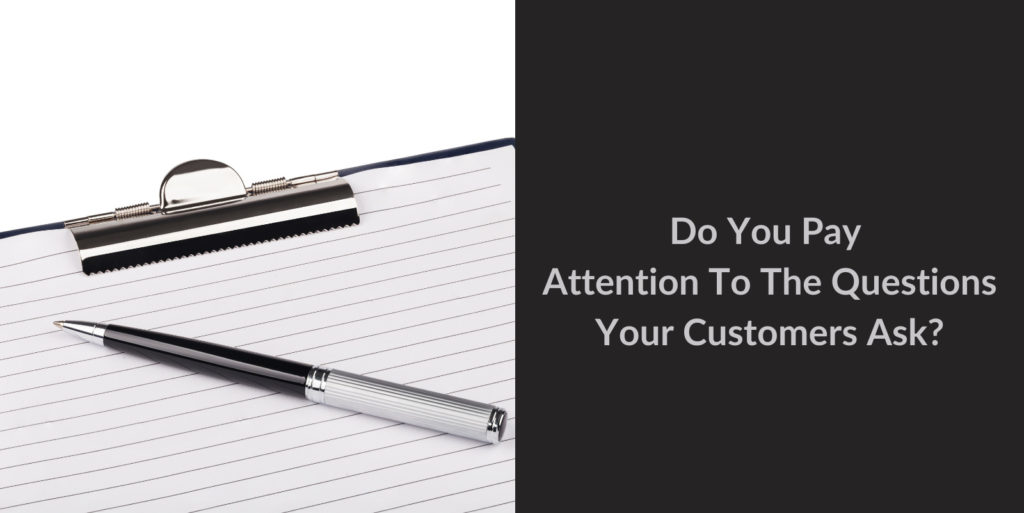Estimated reading time: 5 minutes
Customers pay the bills and are the reason we exist.
Many organizations miss opportunities by not paying attention to simple requests that customers make.
There are many tools available to solicit feedback from customers – which is an active way to learn about the consumer’s experience.
Focus groups, comment cards, and satisfaction surveys are all great tools that can be used to solicit feedback and improve products or services.
Customer feedback allows business owners to learn what they are doing right, but more importantly, what they could be doing better at.
For instance, if you learn through a satisfaction survey, that your receptionist is rude to customers, you may explore ways to train on customer service or initiate service standards for employees to abide by.
You Can Learn A Lot From Simple Questions
Another great opportunity to understand a consumer’s experience is by taking advantage of customer questions.
Customer questions provide a great learning opportunity.
What we learn from customer questions is very valuable and should be used as yet another tool to improve our products and services.
If you pay attention, simple questions can generate ideas for improving or adding to your product list or services.
For example, I was eating at a restaurant the other day and asked the waitress about a menu item.
I inquired as to whether I could have a soup and salad combination instead of a large salad and a cup of soup – since it was not a specific menu option.
I was a little surprised when she said something that you should never say to a customer, and that was a flat-out said, “No.”
I was thinking to myself, what a missed opportunity to add a menu item that might appeal to a large number of people and make this customer’s day.
I know that I am merely an audience of one, but I know enough people (women) who like smaller portions and love soup (especially on a cold rainy day).
I’ve eaten in restaurants that do a great job of working with the customers to customize food orders to the patrons’ requests.
Pay attention to customer questions and you will identify potential new products or services and perhaps also learn how to improve employee training.
In the above example, I’d be willing to guess if the manager had heard the server respond to me, they would have interjected and offered the option to me.
I’ll never know for sure, but I think it’s possible. It was a missed opportunity on both fronts.
So, how do you learn from customer questions?
1. Keep a Question Log
Keep a log by the phone (if using a call center), by the register at a store or restaurant, or you could use technology by sending emails or texts to a central location.
You can also track customer questions over time and see how often those questions are asked.
For instance, if customers of your restaurant ask if you offer a rewards program or weekly specials, you may want to consider experimenting with new programs to see if they increase monthly revenues.
Set a calendar for tracking and see what shows up.
For instance, take the month of September and ask all employees to document customer questions and complaints. Incentivize employees to be consistent, as you don’t want to miss even one comment.
2. Create Question Categories
Hopefully, you have a good list of questions/comments.
Take these questions and put them into categories.
Example categories for a restaurant might be:
- Menu Options
- Customer Incentives
- Food Source
- Employee Training
Take a team of employees and explore each of the questions/comments from each category, and work to create an action plan.
For instance, if customers are asking questions about rewards programs, have a team explore incentives to keep customers coming back. A loyalty program might be punch cards, digital rewards, or a points program.
Try to learn what other restaurants are doing and create a competitive program that will keep customers coming back.
3. Experiment With New Programs
Now that you have launched a new program don’t make the mistake of stopping there.
Track usage and customer loyalty from the program.
Pay attention to the attrition rate of customers and how many new customers you are able to attract with a new program.
If numbers are going up, take advantage of the increase and start marketing the program.
4. Keep Asking Questions
A mistake many businesses make is starting a successful program and putting it on autopilot.
Avoid falling into this trap by creating a process and calendar to track questions.
Incorporate question tracking into employee job descriptions and make them part of their annual goals.
Get employees involved and ask them to offer ideas and suggestions that might provide improved products or services to your customers.
Use Data to Influence Business Decisions.
The secret to business success is the ability to learn what the customer wants and create products and services to meet those requests.
Take every opportunity to capture the customer’s thoughts, ideas, and suggestions. Use teams of employees to help develop plans for acting on suggestions and then track customer response.
Customer questions should be viewed as a gift rather than an annoyance. Pay attention to customer questions, capturing the moment, and you will learn that these valuable opportunities should never be missed.
Do you pay attention to customer questions?
